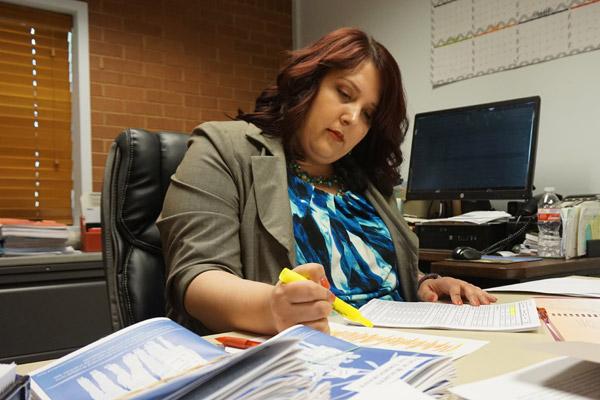
Maricella Garcia, director of Catholic Charities Immigration Services in Little Rock, said it is important for all immigrants, whether they are undocumented or not, to exercise their rights. A common misconception is that anyone who is here undocumented should or can be deported. She said there are many undocumented immigrants who are in the process of receiving visas and are here lawfully.
Since the presidential election, Garcia said Catholic Charities has traveled all over Arkansas addressing immigrant concerns about immigration and deportation. She said the key right now is not to panic, but be prepared.
“Sit back and think about if I can contain this, how do I want this decision to be made. I heard from another attorney locally that he was getting calls that people were saying they were going to sell their house, it didn’t matter how much they lost on it, because they were worried if they were detained that they would just lose everything and not be able to have anyone help them,” Garcia said.
There are some who are consulting with lawyers about designating a power of attorney for an individual to make decisions for children in the family should they be deported. It’s important for immigrants to have the phone number for their consulate on them who can do everything from inform a family that the person has been detained to making sure a person is receiving any required medications because the consulate has the right to visit that person regularly.
Being detained also does not mean a person will automatically be deported, Garcia said.
Garcia said when someone is approached by law enforcement they need to follow these steps:
• They need to tell them their name.
• They need to ask for an attorney.
• They need to ask to make a phone call.
• They need to ask to call their consulate.
• They should not sign any documents or make any admission of guilt.
“If you sign it and you say guilty or whatever, there is no coming back from that most times. There really is not,” Garcia said. “So the most important thing that anyone having an interaction with law enforcement no matter who they are and what status they have whether it’s the police or all the way to immigration, you have to enforce your rights until someone can get there to help you to do it.”
It’s also important to be aware that if someone is detained at the local county jail in the middle of the night or a weekend, access to an attorney will likely not happen until visiting hours the next morning, she said. Immigrants must exercise their rights and call their consulate in those situations.
For immigrants detained by ICE agents, they need to say they will not answer any questions without an attorney, Garcia said.
For more information, the American Friends Service Committee has released a booklet “Your Rights as an Immigrant” in both Spanish and English. It can be accessed at afsc.org/resource/know-your-rights-immigrant-english-and-spanish.
Please read our Comments Policy before posting.
Article comments powered by Disqus Clergy blast Texas lawsuit targeting migrant ministry
Clergy blast Texas lawsuit targeting migrant ministry
 U.S. bishop hails government’s refugee plan for 2024
U.S. bishop hails government’s refugee plan for 2024
 Mass and holy hour mark start of Respect Life Month
Mass and holy hour mark start of Respect Life Month
 'What's going to happen?': 'Dreamers' in legal limbo
'What's going to happen?': 'Dreamers' in legal limbo
 Voluntarios de Pax Christi comprueban realidad de la frontera
Voluntarios de Pax Christi comprueban realidad de la frontera
 New season of ‘The Chosen’ delayed on streaming sites
New season of ‘The Chosen’ delayed on streaming sites
 Father Keller, oldest diocesan priest, a pro-life champion
Father Keller, oldest diocesan priest, a pro-life champion
 Vatican says abortion, surrogacy attack human dignity
Vatican says abortion, surrogacy attack human dignity
 Iowa basketball superstar supported by Catholic faith
Iowa basketball superstar supported by Catholic faith
 A Catholic You Want to Know: Joan Becker
A Catholic You Want to Know: Joan Becker
 Two gifts after Jesus’ death: Virgin Mary and Eucharist
Two gifts after Jesus’ death: Virgin Mary and Eucharist
 Why we have an altar, and not just a communion table
Why we have an altar, and not just a communion table
 Pope: Wars should be resolved through nonviolence
Pope: Wars should be resolved through nonviolence
 Living relationship with Jesus Christ in the Eucharist
Living relationship with Jesus Christ in the Eucharist
 Crosses: Adversities you could avoid, but are embraced
Crosses: Adversities you could avoid, but are embraced